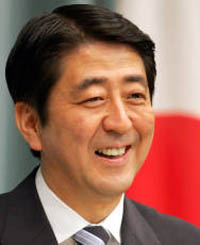Abe changes Japan's view on World War II

Shinzo Abe changes the Japan’s view on its wartime history front-and-center ahead of a major parliamentary election this weekend.
Heading into Sunday's upper house elections, Abe is stressing a "Beautiful Japan" platform of promoting patriotism, overhauling the constitution so that the military can play a bigger role abroad and revising school textbooks - critics would say whitewashing history - to bolster national pride.
"I have renewed my resolve to make further progress toward realizing a new Japan, a country admired and respected by people in the world, a country our children's generation can have self-confidence and pride in," he said in a speech marking Constitution Day in May.
But his avowedly nationalist stance doesn't seem to be swaying voters, who seem more focused on scandals in his Cabinet and a perceived lack of leadership. His support rating, which once stood at 70 percent, has plummeted to around 30 percent. Abe himself is not up for re-election on Sunday, but polls suggest his party could suffer a major setback.
"He talks about patriotism all the time, but I don't think people understand what he means," said Eiken Itagaki, a well-known commentator and political analyst. "I don't think it will help him much at the polls. In fact, I think it is scaring voters away."
Many Japanese voters, particularly older ones, remain highly suspicious of efforts they perceive as harkening back to the days before their country's disastrous defeat in 1945, when Japan's government stressed nationalism and sacrifice to bolster its military conquest of Asia.
Some conservatives, however, believe that the war was justified and that war crimes have been exaggerated.
In a political gamble, Abe has been playing to that crowd.
With Abe's blessing, a group of roughly 100 lawmakers that he helped create before taking office is undertaking a high-profile review of several controverisal World War II-era issues.
The issues include the 1937 Rape of Nanking, in which Japanese soldiers slaughtered civilians and pillaged the city; the forced suicides of Okinawan civilians by Japanese soldiers in 1945; and "comfort women," the euphemism for forced prostitution during World War II.
The group of conservative lawmakers claims that excessively negative portrayals of history serve only to hurt Japan's image and run counter to Abe's "Beautiful Japan" policy. They want to keep such depictions out of junior high school textbooks.
Abe, meanwhile, is still reeling over anger from comments he made regarding "comfort women," most of whom were Chinese or Korean.
He found himself in a firestorm - at home and abroad - after saying there was no proof Japan's government had coerced any of the women into prostitution. Historians, who put their numbers at between 50,000 and 200,000, generally disagree.
A resolution in the U.S. Congress called on Japan to apologize for its use of prostitutes on the front lines during World War II. Abe retorted that the resolution was "not based on fact."
Keeping his own Cabinet in line on the interpretation of history has been another headache.
A Cabinet minister who strayed from the conservative line was forced to resign earlier this month after suggesting that the U.S. atomic bomb attacks on Hiroshima and Nagasaki were unavoidable. Conservatives call the bombings acts of unjustifiable brutality.
"I just meant that there was nothing we could do about it," Defense Minister Fumio Kyuma said after tendering his resignation. "I don't think people understood what I meant."
Abe's one major accomplishment has been largely ideological - education reform.
Amid widespread concern over the deterioration of the quality of Japan's once-vaunted public school system, Abe spearheaded an effort to rewrite the Fundamental Law on Education, which had replaced a prewar structure that was highly nationalist in its goals.
Abe took on two specific, practical reforms - mandating a review of teacher's licences every 10 years and granting the education minister more power to reign in local education boards. But he also restored a stress on "moral education," which critics have panned as an attempt to force political obedience onto children.
"His reforms will radically change the fabric of the education system that was created after serious soul-searching about the mistakes Japan made in the years before and during World War II," The Asahi, a major, left-leaning newspaper, said in an editorial on Tuesday.
"How will the voters judge it?" The Asahi asked.
So far, Abe's message does not seem to be outweighing anger over problems with the national pension system, questionable use of public funds for private offices by Cabinet members and a widening gap between the rich and poor.
Subscribe to Pravda.Ru Telegram channel, Facebook, RSS!


